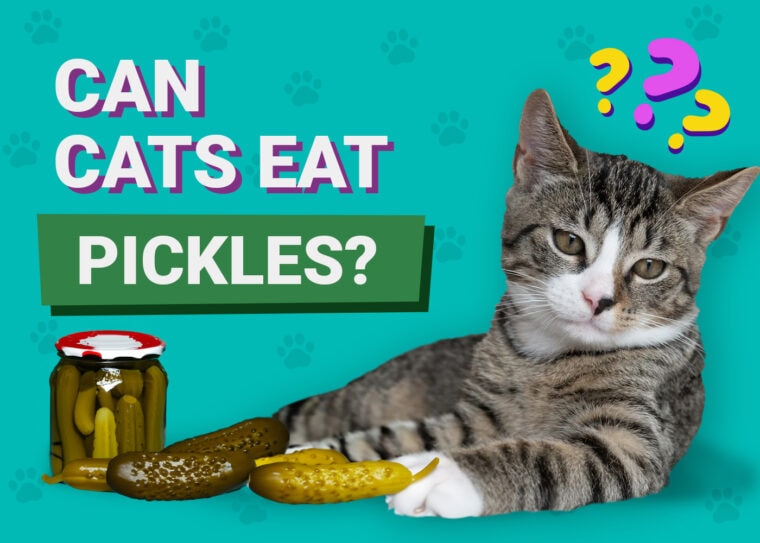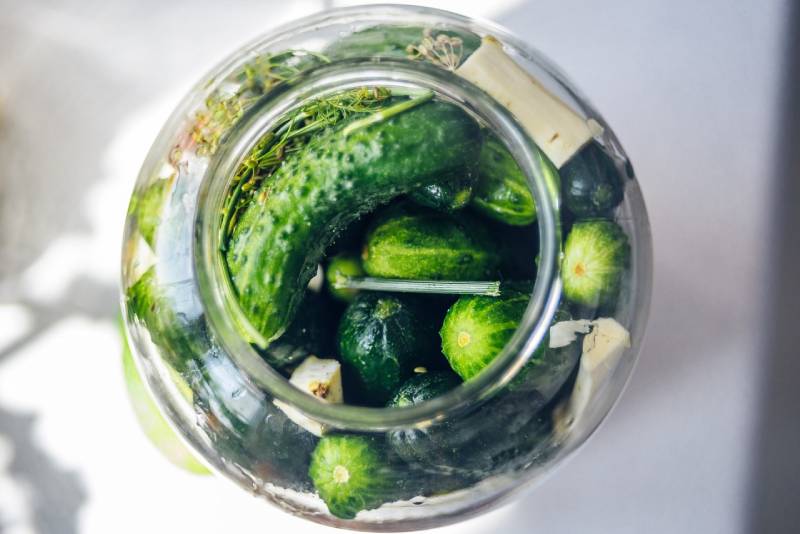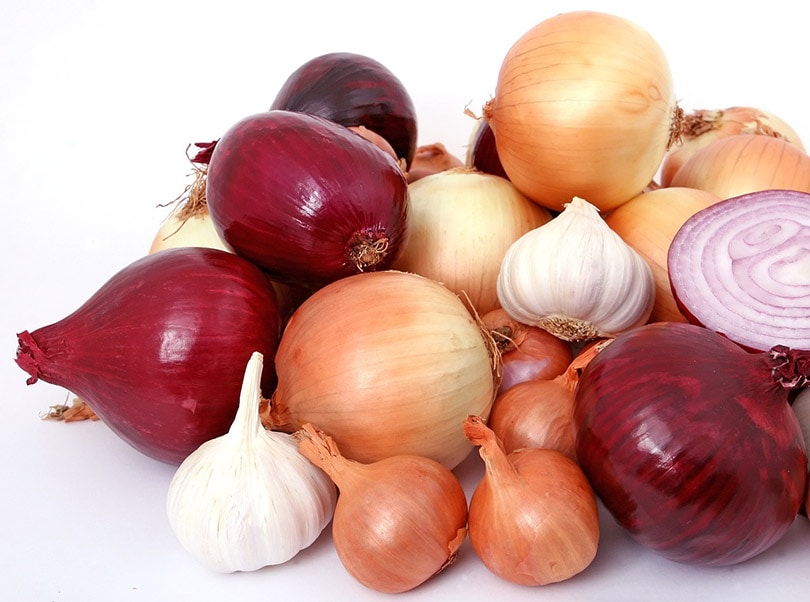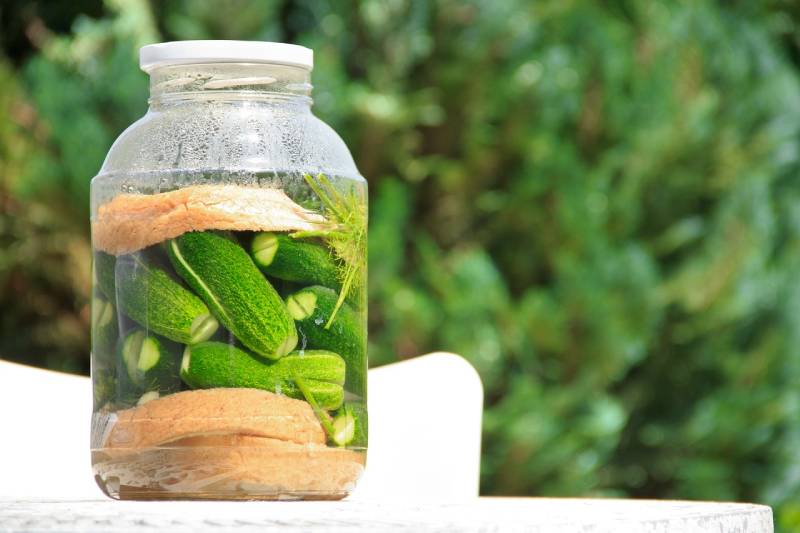
Cats are obligate carnivores, meaning their diet should primarily consist of meat. While cats are known to be curious and may try to eat various foods, including human foods, feeding pickles to cats is generally not recommended and can even be dangerous.
While fresh, plain cucumbers themselves are not harmful, it’s the pickling process and ingredients that cause problems for cats. Pickles are made by soaking cucumbers in vinegar, water, salt, and spices. Ingestion of large amounts of salt can cause serious issues. Cats need a small amount of sodium, usually provided in their commercial food. However, they are much smaller than people, requiring much less than us. Additionally, seasonings such as garlic and onion are toxic to cats.
Top 2 Reasons to Not Feed Your Cat Pickles
There are many reasons you should avoid feeding your cat pickles, including:
1. Salt Toxicity
As stated, pickles are extremely high in salt. Cats need a small amount of salt to live, but pickles require far more than they need. While a few bites of a pickle probably won’t lead to problems, your cat may experience adverse effects if they consume several pickles or drink the juice (far higher in salt than the pickles themselves).
If an excessive amount of salt is ingested it causes an electrolyte imbalance and dehydration. Salt toxicity may cause your cat to drink and urinate more than normal. They may become nauseous or even vomit. Lethargy can occur in extreme cases. Tremors and even seizures can happen when a cat is in the late stages of salt toxicity. Without treatment, these seizures can be deadly.
If you suspect your cat has ingested many pickles or pickle juice, it’s important to seek veterinary care immediately. Salt toxicity can be a serious condition that requires prompt treatment to prevent further health complications. Your veterinarian can provide supportive care and may recommend intravenous fluids and other treatments to help your cat recover.

2. Garlic and Onions
Pickles are often made with garlic and onions—both toxic to cats. Garlic and onions are toxic to cats because they contain compounds called thiosulphates. Thiosulphates can cause damage to cats’ red blood cells, leading to anemia. Red blood cells are destroyed faster than the body can replace them, meaning there aren’t enough red blood cells to deliver the right amount of oxygen to the tissues.
The toxic effects of garlic and onions can vary based on the amount ingested and the cat’s size. In general, smaller cats are more susceptible to the toxic effects of these foods than larger cats.
The cat may only need supportive care in mild cases, such as medication to reduce vomiting and IV fluids. Extra-nutritious foods may be required to help the body replace damaged blood cells.
In more severe cases of anemia, the cat may require a blood transfusion to replace the damaged red blood cells. The transfused blood may come from a donor cat or a blood bank. To manage complications, the cat may also require additional supportive care, such as oxygen therapy or medications.
Cats receiving prompt treatment have a better chance of recovery than cats not receiving treatment until the anemia is severe. Therefore, if your cat consumes a lot of pickles, seeking vet care right away is recommended.

Can Pickle Juice Harm Cats?
Pickle juice tends to contain more harmful ingredients than the pickles themselves. Pickle juice can cause salt toxicity if your cat consumes too much. Often, pickle juice also contains onions and garlic.
It’s often easier for cats to drink too much pickle juice than eat too many pickles. With this in mind, pickle juice is often much more toxic than pickles. Some online sources recommend pickle juice to help with your cat’s breath. However, this isn’t safe in the slightest.
Not only is pickle juice unsafe for cats, but giving pickle juice is unlikely to address the underlying cause of bad breath. Instead, it’s important to work with a veterinarian to identify the cause of the bad breath. Brushing your cat’s teeth is a far better way to handle bad breath than giving pickle juice.

When to Seek Veterinary Care
If your cat has ingested a small amount of pickles or pickle juice, you should monitor them closely for any signs of gastrointestinal upset, such as vomiting, diarrhea, or loss of appetite. If your cat exhibits any signs of being unwell, it’s important to seek veterinary care immediately.
Furthermore, suppose you suspect your cat has ingested a lot of pickle juice or pickles. In that case, you should seek veterinary care immediately, as this can lead to salt toxicity, which can cause serious health complications.
When in doubt, always give your vet a call.
Knowing exactly what your feline companion can and cannot eat will help you become the best pet parent. Recognizing that not all cat bowls are equal is also key! The Hepper NomNom Cat Bowl sets itself apart from traditional options by catering to the specific needs of cats. The innovative design offers whisker relief via shallow dishes and promotes digestion with a slight bowl elevation. Find out if the Hepper NomNom is right for your cat by clicking here.
At Pet Keen, we’ve admired Hepper for many years and decided to take a controlling ownership interest so that we could benefit from the outstanding designs of this cool cat company!
Conclusion
Cats should never consume pickles. Pickles are typically very high in sodium, which can harm cats if consumed in large amounts. Consuming large amounts of sodium can lead to salt toxicity, which can cause various health complications. In serious cases, it can even be deadly.
Pickles are also made with garlic and onions in most cases which are toxic to cats in large amounts. In most cases, one nibble on a pickle or lick of pickle juice won’t have enough to cause adverse effects. However, eating a large amount may cause problems. Toxicity caused by onions and garlic can take many days to set in and causes anemia.
Featured Image Credit: PhotoMIX-Company, Pixabay








